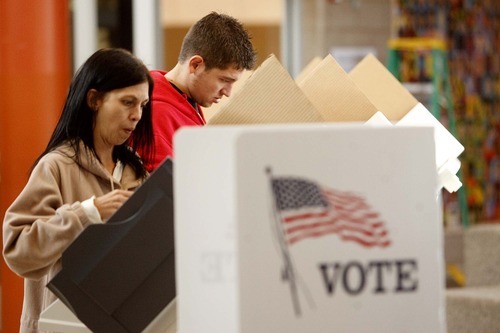This is an archived article that was published on sltrib.com in 2012, and information in the article may be outdated. It is provided only for personal research purposes and may not be reprinted.
About two of every five voter registrations in Utah have significant problems. The voter may have a duplicate registration elsewhere, may be dead or simply has an address that is wrong.
That's according to research by the Pew Center on the States reported to the Utah Lieutenant Governor's Office, said Mark Thomas, director of elections.
Pew released a nationwide study Monday that says nationally one out of every eight voter registrations is invalid or significantly inaccurate.
Problems identified in Utah were much more common than the national average. But Pew officials praised Utah for being one of a few states trying to fix "inaccurate, costly and inefficient" registration systems.
Pew contracted with RTI International, which used a private database developed by requesting voter lists from all states and combining it with other public sources such as the U.S. Postal Service's National Change of Address database and death records from the Social Security Administration.
It compared those databases to find duplicate registrations, multiple addresses for the same person or deceased people on voter rolls.
"Their study showed that about 300,000 registrations out of our 1.2 million active voters were inaccurate," Thomas said.
That's besides another 300,000 on Utah's "inactive registration" list, where people technically could still vote but have not done so for several elections or have been identified by county clerks as likely having moved or died.
So of the 1.5 million total eligible voters on Utah rolls, 600,000 have problems, Thomas said. Of note, the U.S. census said recently that Utah has 1.94 million citizens old enough to vote.
Despite the high number of problems, Pew praised Utah for being among eight states so far that have formed a coalition to share information to find such problems as they occur so they can be corrected. Also, Utah is one of just nine states that allows online voter registration — which Pew says reduces costs and makes it easier for voters to update information. Utah was the third state to allow online registration, beginning in 2010.
Thomas said the coalition to share data — which he says could grow to 20 states this year — allows, for example, Utah election officials to be notified if a person moved here from California and obtained a driver license without registering to vote.
"We could send him a postcard or letter saying, 'It appears you have moved to Utah. Would you like to register here?' And we could give him the link on how to do that," Thomas said.
At the same time, Utah could notify California of the move.
Thomas added that the Lieutenant Governor's Office intends not only to push for more Utahns to register to vote this year but also to clean up their registration information. That information is available at voter.utah.gov.
Thomas said a major reason for problems here is that people — especially younger adults — tend to move often but do not think to have old voter registration deleted when they reregister elsewhere.
The Legislature is also considering several bills aimed at cleaning up voter rolls.
HB253 sponsored by Rep. Kraig Powell, R-Heber City, would allow county clerks to send letters to people who do not vote in two consecutive general elections to verify their address. If the U.S. Postal Service sends that mailing back, saying it was undeliverable because of a bad address, clerks will send a second letter.
The second will notify the voters that if they fail to vote in one of the next two general elections, their names will be removed from the rolls.
While the bill has passed the House, it is controversial because some critics say it may violate the federal Voting Rights Act, which bans removing voters from registration rolls merely for not voting. Powell says they would be removed because of the notice of a bad address instead and would have ample time and opportunity to correct it.
Also, HB105 by Rep. Merlynn Newbold, R-South Jordan, would require removal of the names of dead people from voter rolls within three days of notification by a board of health. She complains she recently received a by-mail ballot for her father, who had been dead for a year and a half. HB105 awaits action before the full House after clearing a committee.



